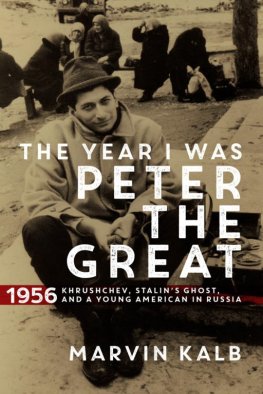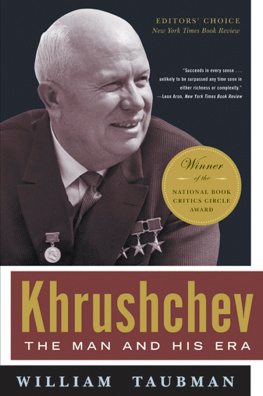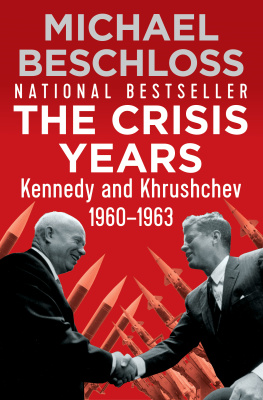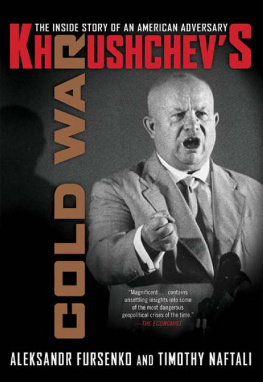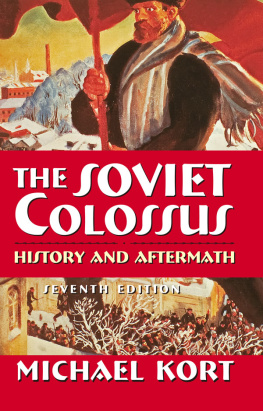KHRUSHCHEV
Edward Crankshaw

Contents
Chapter 1
From Log Cabin to Red Square
One evening when Khrushchev was at the summit of his power he was holding forth in one of his more ebullient moods to a group of Western diplomatists at a reception in Moscow. Suddenly, irritated by their professional coolness and evasiveness, he checked himself and exclaimed: When I find myself talking to you gentlemen, I also find myself wondering. You all went to great schools, to famous universitiesto Harvard, to Oxford, to the Sorbonne. I never had any proper schooling. I went about barefoot and in rags. When you were in the nursery I was herding cows for two kopeks. I had no diplomatic training And yet here we are, and I can make rings round you all. Tell me, gentlemen, why?
That story is no doubt partly apocryphal, like most good stories. But like most apocryphal stories it strikes at the heart of the matter. Nobody in that little circle cared to hazard an answer to Khrushchevs interesting question. It is worth trying to answer it now.
He was born in 1894, the child of peasants who were later driven from the land, the family home, by poverty. The family home belonged to his grandfather: it was a mud hut, or izba, with a ragged thatched roof, in Kalinovka, a poor village in the very rich Government of Kursk, where Great Russia borders the Ukraine. The grandfather had been born a serf, the absolute chattel of his master, who could sell him, or exchange him for a pony or a gun-dog, without anybody asking why.Khrushchev, was one of those many peasants who were defeated by the consequences of the abolition of serfdom by Alexander II in 1861, soon after the Crimean War. There was not enough land to go round: only the strongest, the cleverest, the most predatory among them could make a decent living from their own land; the rest scraped a subsistence, got hopelessly into debt to the inevitable greedy and acquisitive village kulak, spent their energies toiling for a pittance on the big landowners fields, or drifted to the towns to better themselves. Sergei Nicaronovich was one of these. Leaving his wife and children behind in his fathers izba he went seasonally to work for the winter as a carpenter in the coalfields of the Donets valley, returning in the spring to work on the land. His great ambition, Khrushchev was much later to say, was to buy himself a horse, but he never saved enough for this, and, in the end, the whole family moved for good.
Thus the infant Khrushchev was one of a vast family of nearly 100 million peasants, mainly illiterate, lately liberated from serfdom, who then formed four-fifths of the population of Imperial Russia. Nobody knows where the name Khrushchev came from. But there was a wealthy landowning family of Khrushchevs in the eastern Ukraine, and it is likely that Nikitas own forebears lived as serfs on the Khrushchev estate, taking their name from the master, as was common in those days. Nikita himself was christened Nikita Sergeievich, Nikita son of Sergei, after his father. He was a child without a history, and as an infant he was lucky to survive. There was nothing in his background to distinguish him from a hundred million other peasants so primitive and backward in their attitudes and standards that they belonged effectively to another world from ours. Sixty years later, nevertheless, he was to become the autocrat of the Soviet Empire, now the home of 220 million souls, disposing of a massive and complex economy, a vast and modern army, navy and air force, and presiding over the launching of the first man into space.
His opportunity was the Revolution of 1917, which shattered the framework of Russian society and threw the field open to all the talents, heavily favouring the workers in the towns. But there were still more than a hundred million peasants and workers for Khrushchev to compete with. He was twenty-three at the time of the Revolution and his education had been limited to two or three years in the village school. He did not join the Bolsheviks until 1918, when he was twenty-four. It would be evident from this brief record alone that Khrushchev was a man of extraordinary gifts and also of obvious limitations. Yet when he began to emerge as the supreme leader of the Soviet Union in 1954 there were many who could not bring themselves to believe that he was a man with the secret of leadership and power. He was contrasted unfavourably with his predecessor, Stalin: a pygmy, it was said, had succeeded a giant.
To understand how this mistake could be made and to appreciate the character of Khrushchev it is necessary to range far and wide over the landscape of Russian society, moving away from the record of the mans immediate activities, and back again: he was formed by the Russia which he himself sought to mould, and because in a book of this limited size it is out of the question to bring alive the whole country, for so long terribly convulsed, we must, from time to time, select certain keys to the general situation.
For example, it is useful to bear in mind that Nikita Sergeievich Khrushchev was born at almost precisely the same moment in time as the fictional hero of Pasternaks great novel, Doctor Zhivago; the Russia into which he was born and the times through which he lived were thus the Russia and the times of Yuri Zhivago. But Zhivago was a bourgeois and Khrushchev was a peasant. When Yuri Zhivago was riding about the Russian countryside in an open carriage with his uncle, visiting wealthy and cultivated rural notabilities, the young Khrushchev, nine years old, had already left school and was herding the village cows.
Uncle Kolya was interested in the land-problem, and on one of his excursions, with Yuri Zhivago at his side, he reflected aloud to the driver on the dangerous mood of the peasants:
People are getting pretty rough here, he said: A merchant has had his throat slit and the stud-farm of the Zemsky has been burned down. What do you think of it all? What are they saying in your village?
Uncle Kolyas driver was a jumped-up hanger-on of the Russian intelligentsia, himself precariously separated from the immemorial masses by a veneer of education. Nikita Khrushchev was a child of those peasants. The year was 1903.
Again, in the civil war after the Revolution, that fearful, confused, anarchic, treacherous struggle in which Zhivago found himself unable to aim his rifle to shoot a fellow-countryman, even when under fire himself, Nikita Khrushchev, now twenty-five, a new Bolshevik, was a Red Army man, ready to fight ruthlessly and violently and urging ruthlessness and violence on his softer comrades.
Much later, when Lara, Pasternaks beloved heroine, was taken away by the political police to perish miserably, Nikita Khrushchev stood at the right hand of the man who caused her to be sent away:
One day Lara went out and did not come back. She must have been arrested in the street, as so often happened in those days, and she died or vanished somewhere, forgotten, a nameless number on a list which was later mislaid, in one of the innumerable concentration camps in the north.
Those are the closing words of Doctor Zhivago, except for the Epilogue. Khrushchev was later to do away with many of those concentration camps, but, when he attained supreme power, he retained a number of them. And it was he who allowed Pasternak, the creator of Yuri Zhivago and Lara, to be persecuted to death; and when Pasternak was dead he allowed the real Lara, one of the models for Pasternaks heroine, who had in fact survived the labour-camps, to be picked up and arrested on a trumped-up charge and sent away again, this time with her young daughter.


